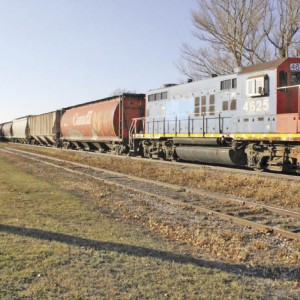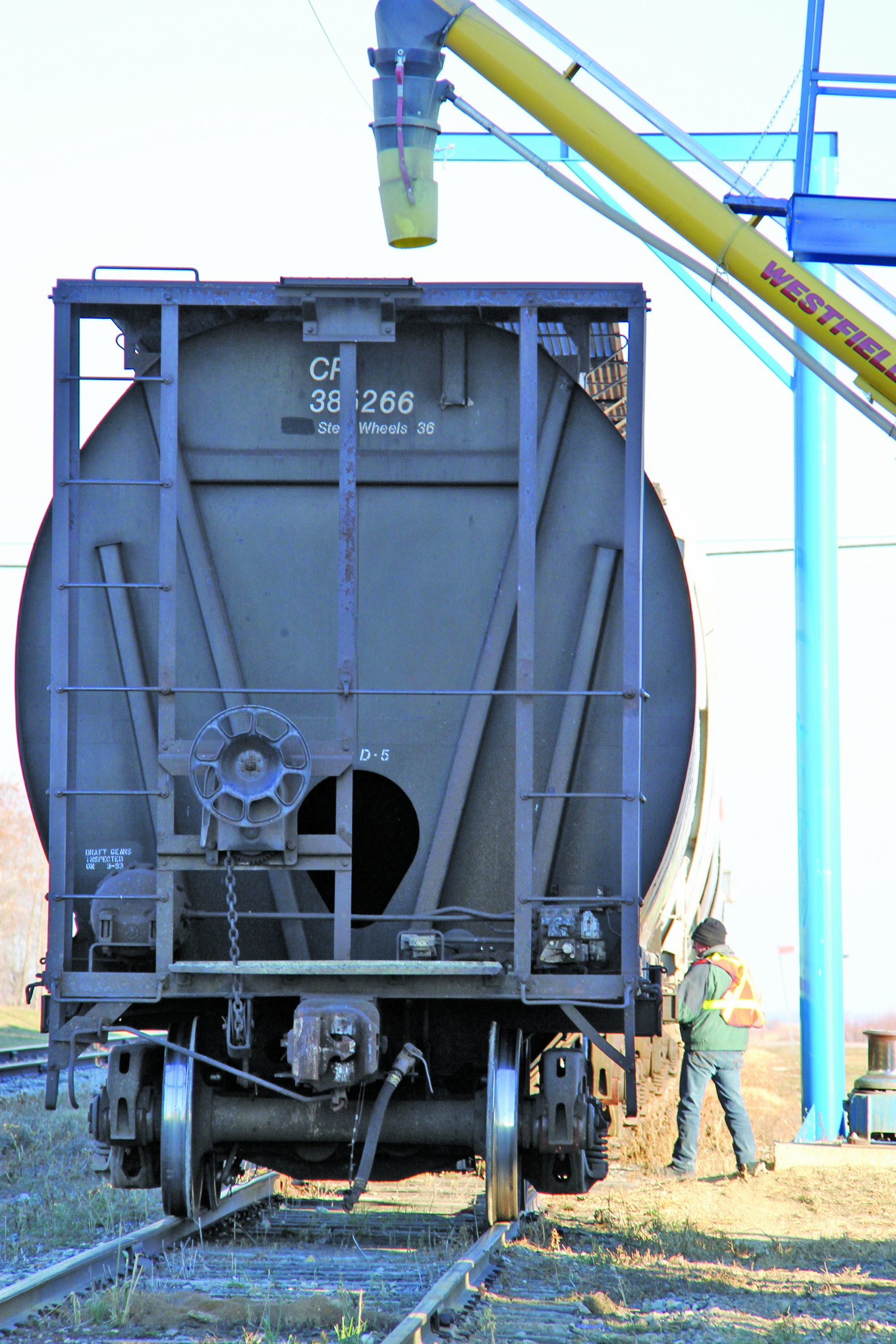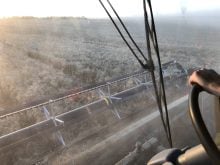
 A12-car train jerks to a steady rhythm every few seconds as part-time engineer Travis Long ever so slowly “stretches” the newly connected cars, while a roaring hum fills the locomotive’s cab.
A12-car train jerks to a steady rhythm every few seconds as part-time engineer Travis Long ever so slowly “stretches” the newly connected cars, while a roaring hum fills the locomotive’s cab.
Read Also

No checkoff decision yet for Manitoba canola growers
Manitoba Canola Growers Association hits pause on any increase in the per-tonne levy for farmers as funding gap widens.
It’s the satisfying sound of grain moving to market via producer cars on the Boundary Trail Railway Company’s (BTRC) short line — 23 miles of track running from just west of Manitou east to Morden where it connects with CP Rail.
“We’re keeping busy,” says Long, the BTRC’s general manager, between radio communications with conductor Glenn Jordan.
While local elevators are plugged with a record harvest — as are most across the West — the BTRC has shipped 150 producer cars this crop year — triple the number moved during the same period a year ago, says Don McLean, a Manitou farmer and BTRC director. The company is owned by 80 shareholders — most of them local farmers.
Western Canadian farmers have had the legal right to order and fill their own cars, saving money by avoiding country elevators, since 1902, after a hard-fought battle with the railway. It appears right now producer car shippers served by the BTRC have an advantage over those trying to deliver to elevators: there is grain moving and at good prices.
“This fall, because our local elevators are plugged so tight, the (elevator) basis levels are so terrible that they can’t compete with us right now,” says McLean.
“The companies we’re dealing with right now are paying what would be considered top dollar compared to our local elevators just because they don’t have to worry about being plugged up and waiting for a train.”
It’s unclear whether producer car shippers across Western Canada are being as well served, and if they are, whether it will continue as the demand for grain cars exceeds the supply.
“At our local point here (on the Southern Rails short line out of Moose Jaw) I think we’re ahead of what we shipped all last year at 362 cars,” says Tim Coulter, a Briercrest, Sask., farmer and president of the Producer Car Shippers of Canada. “In our best year we shipped 400.”
However, Coulter adds he just ordered a producer car and doesn’t expect to get it until March 2014.
The Canadian Grain Commission (CGC) allocates producer cars on a first-come, first-served basis. To qualify, a farmer, or at most five farmers together, must be able to fill a car and have a sale for the grain. However, the CGC only allocates the cars the railways offer and cars are in big demand right now, says Catherine Jaworski, the CGC’s manager of producer protection.
“This could be a difficult year, not only for producer car shippers but everyone really because of the (tight) car supply,” she says. “I suspect we will see producer car shippers in high-demand areas waiting longer for their cars.”
The railways control car allocation. Officials from both CP and CN Rail declined to explain how it rations cars when demand exceeds supply.
Producer car orders used to be filled “off the top” and what was left divvied up among the grain companies.
“Now rail car allocation is a black box,” says a retired producer car expert. “It’s a mystery.”
So far farmers served by the BTRC are getting the cars they’ve ordered and there’s no indication that will change, says McLean.
“We have nothing bad to say about how CP has been handling our cars so far.”
As of week 15 of the 2013-14 crop year 4,381 producer cars had been ordered — down 953 cars from the same time a year ago, according to CGC statistics. However, 286 more cars were scheduled for spotting this year versus last.
Last crop year 9,259 producer cars were shipped, down more than 5,000 or 35 per cent from 2011-12 — the last year of the Canadian Wheat Board’s monopoly.
As predicted, producer car shipments plunged in the new open market. Western Canada’s grain companies have no incentive to help farmers bypass their elevators. Under the wheat board’s single desk, farmers could save $800 to $1,200 in elevation charges by loading their own cars. The wheat board would take delivery of producer cars at port.
Last winter the BTRC worked hard and found two new American grain companies without elevators here willing to buy grain shipped in producer cars — The Andersons and Gavilon Group.
The BTRC calls it “the Quaker Oats” model. The American processor has been buying oats via producer cars for several years.
“We’re cutting out the middleman and that’s probably where the savings are,” McLean says.Other BTRC customers include the CWB and Mission Terminal.
“It’s a program that works very, very well for companies without elevators.”
There’s no hard feelings over at the Western Grain Elevator Association, says executive director Wade Sobkowich. “We support the farmer’s right to ship a producer car,” he says.
“If there were (producer car) companies getting preferential treatment we’d want to take a look at that, but from where we sit everybody… is kind of getting rationed back big time. We don’t really know for sure, but we don’t see any evidence of any blatant discrimination.”
Country elevators remain nearly full, while there’s ample space at port terminals. Elevator car orders are backing up, Sobkowich says.
The elevators and producer car shippers getting cars are probably also turning the cars quickly, he adds.
“We’re in the right spot by the sounds of it,” McLean says. “We’re nice and close to Thunder Bay… and to Winnipeg so for them (CP) we can turn cars around really, really quickly.
“Maybe right now it’s hard to get 100 cars at a time. Maybe what we’re doing with 10 or 15 cars at a time works better for CP — I don’t know. That’s a possibility.”
















